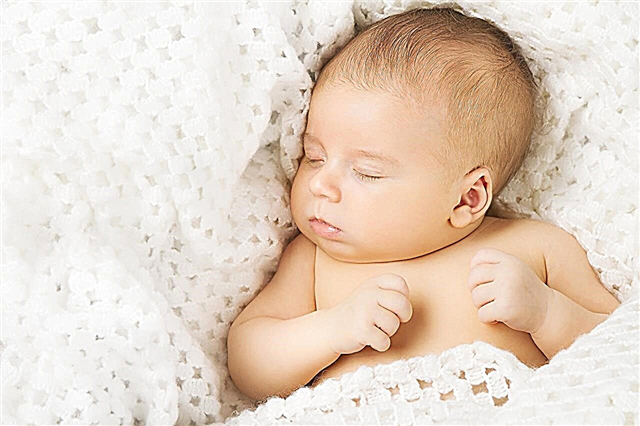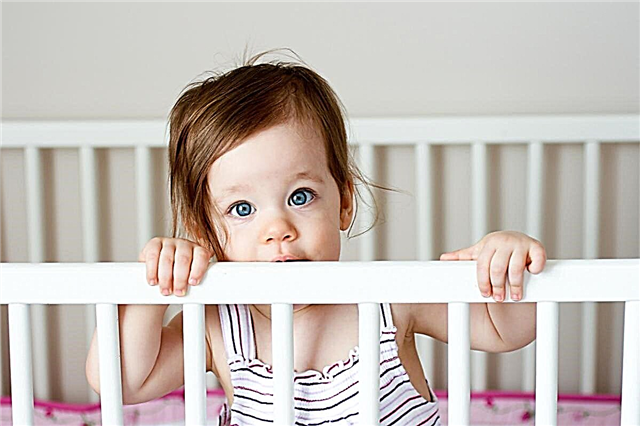It is important for young parents to understand how the baby's rest period should go. Sleep for a newborn is the time when the body is resting and gaining new strength, babies grow up in sleep. How to know how much a newborn should sleep? Should I introduce a special mode, and what phases of sleep does the child have? All of these important questions are faced by mums and dads.

Sleep in the first days of life takes almost a whole day.
How long babies sleep
Children are born weak, so the first weeks of their life are spent building up the strength required for development. Being in the womb, the child gets used to the aquatic environment. At birth, he finds himself in a different space, with a different atmospheric pressure, to which he has to get used again. For adults, the world around them seems simple: it is easy to breathe air, the pressure of the atmospheric column remains unnoticed. Newborns take a lot of effort to breathe and make simple movements. Therefore, the first days of life, the baby sleeps more, gains strength and gets used to the world. In the first month, the duration of rest is much longer than the waking period: the babies sleep for about 20 hours, the rest of the time they eat. In the future, the baby sleeps less and less, more strength will appear to explore the world around him.
Sleep duration by months to a year
The baby's sleep for the first time depends on how much time has passed since his birth. Further, the duration of sleep in newborns varies by month:
- The sleep of a newborn during the first 2 weeks of life takes almost a whole day (20-22 hours). He sleeps at this time with breaks, because the baby does not yet understand when day and night comes. During the day, the baby sleeps for 2-3 hours in a row, at night a little longer. He periodically wakes up to refresh himself. If he does not receive milk every 3-4 hours, he will not have enough strength, so frequent awakenings are the norm.
- Over the next few weeks, the duration of rest slowly decreases to 16-18 hours per day. The baby is accustomed to the environment and can do without feeding at night for about 6 hours. In the afternoon after feeding, he will not immediately fall asleep. Now he will study the world around him, only after that he will get tired.
- Sleep in infants begins to change by months from the third. By the end of this period, it is enough for the baby to pour out 15-16 total hours per day.
- In the period up to six months, the transition to night rest begins, but he still needs rest breaks during the day. In total, the rest will also take about 15 hours, of which 8-10 - at night, the rest is broken into short dreams for babies during the day for 1-1.5 hours.
- Over the next 3 months (from 6 to 9), the total rest time is reduced to 12 hours a day. Most of the time, the baby rests at night. In the afternoon, rest is required in the afternoon and in the afternoon for 1-1.5 hours.
- From 9 months to one year, children need 10-11 hours of rest, which includes two short rest breaks during the day. Parents try to establish the daily routine of the baby and not break it.

The regimen up to a year changes every 2-3 months
How to organize a child's sleep
How much children will sleep depends on the parents. Sleep in newborns at night can be made longer by introducing an approximate regimen from 2-3 months. Gradually, babies get used to the routine and quickly switch to nighttime rest. To introduce the regimen, parents do the following:
- They try to observe the same time every day when they put the baby on a day's rest.
- The period of wakefulness before bedtime is slightly lengthened to tire the baby.
- So that the baby sleeps soundly at night, they bathe him, feed him, communicate with him, sometimes go for a walk. All of these actions are important for babies to sleep.
Attention! You should not delay with the wakefulness period, otherwise the baby will be capricious and more difficult to fall asleep.
Starting at six months, children grasp the daily routine better - this is the ideal time to introduce a clearer routine. Many parents during this period try to accustom their baby to the procedures:
- Mom washes him in the morning.
- In the evenings he bathes in a bath.
- All procedures are accompanied by repeating words, songs, so that a reaction to familiar actions is triggered.

The child begins to accustom to the regime from six months
Baby's sleep in the 1st year
Parents can track a newborn's sleep by months using a short table.
Sleep intervals up to a year
| Age | Generally | At night |
|---|---|---|
| 2 weeks from birth | About 20 hours with waking up every 3-4 hours | |
| 2 | About 18 | Up to 5 |
| 3C | About 16 | Until 6 |
| From 3 months to half a year | About 17 | Up to 7 |
| From six months to 9 months | 12 | Up to 9 |
| From 9 months to a year | 11 | To 10 |
Night time
At first, the baby will sleep almost round the clock. Periods for night and day rest are not separated. From 3 months, when babies get better at night, the intervals between feedings also increase. At night, the baby can go without feeding for longer. Gradually, children begin to sleep continuously at night, by the year the duration of night rest decreases in total to 10 hours.
Daytime rest
Daytime rest is formed in infants from 3 months, when during this period they rest more at night. Up to six months, children sleep in small intervals three times a day. From 6-9 months, daily rest is required twice a day. Gradually, by the year, parents can introduce 1 rest break.
Sleep phases in infants
An adult's sleep contains about 6 phases. When children are not yet a year old, they only have two phases:
- Deep. Children during this period are relaxed, the body is resting right now.
- Surface. The kid continues to rest, but this is accompanied by body movements: he can open his mouth, open his eyes, change his facial expression. During this period, children are easy to wake up, they themselves often wake up from their own touch of the hand or startle.

After a year, children have more phases
Impact of phases
Most of the child's dream is occupied by the deep phase (60%), the rest is superficial. During the entire rest period, these phases alternately replace each other every 20-30 minutes. In children up to six months, the phase change cycle is about 50-60 minutes: 30/40 minutes deep sleep and 20 minutes - superficial. Up to a year, this cycle increases to 70 minutes.
After a year, children will gradually add other phases. In order not to disturb them, the parents observe silence and switch to dim lighting (draw up the curtains, turn on the night light).
If the kid confuses day with night
For healthy development, the baby sleeps the prescribed number of hours at night and during the day, but it happens that he seems to confuse the time of day. The reasons why this happens can be different:
- Difficulty sleeping at night occurs when the child has a bad and hectic daytime sleep - often wakes up. He does not have time to rest, is overexcited and sleeps more restlessly at night.
- A good rest for children is possible in a comfortable environment. If your baby has wet diapers, clothes that are too hot, or dry indoor air, these can all contribute to anxiety. From this, the night hours of rest are shifted.
- Lack of fresh air can make it difficult to fall asleep. Before going to bed, try to ventilate the room.
- A walk on the street tires the baby in a timely manner and helps to fall asleep better. In winter, frost promotes deep sleep; in summer, children get tired faster from heat.
- The cause of concern may lie in abdominal pain.

In order for the baby to sleep soundly at night, the mother provides for possible discomfort
How to get sleep
For children to develop according to their age, they need rest. Parents can anticipate problems with falling asleep and sound sleep in advance.
Children often get used to sleeping with their mother and feel fear without her presence. Resting in a crib will be quieter. Here the baby feels comfortable. To organize a relaxing holiday, the mother tries to satisfy all the baby's needs before bed.
When the baby is put to bed, the parents stay close and talk to him. He falls asleep more calmly when he feels the closeness of his parents. Parents can leave when they are sure that the baby is fast asleep, leave the door open. In case he starts screaming and crying, they react immediately.
From birth to one year, the sleep period in children gradually changes every couple of months. Parents are guided by the above time limit, but this is not a mandatory number of hours, it may differ for everyone. The gradual introduction of the regimen allows you to transfer the child first to a night's rest, then levels the daily regimen.



